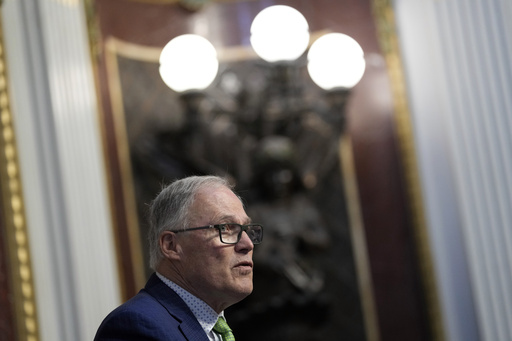OLYMPIA, Wash. (AP) — Jay Inslee closed out the final day of his last legislative session as Washington state governor on Thursday by describing it as a banner year in the state’s fight against climate change.
“I’m confident that 50 years from now, people will look back and say this was our finest hour because we led the nation in tackling this problem,” he told reporters, highlighting a bill passed that is expected to link Washington’s carbon market with California and Quebec, which also have emission allowance auctions.
As the longest-serving governor in office in the U.S., Inslee has sought to make the state a leader in the fight against climate change. But rather than this session putting an exclamation mark on his three terms in office, uncertainty hangs in the air.
One of the biggest climate policies passed during his tenure — along with many programs it is earmarked to fund — hangs in limbo. Conservative-backed initiatives that would repeal the state’s year-old carbon pricing program will be heading to voters in November after lawmakers opted not to consider it this session.
The initiative is one of six certified after the group Let’s Go Washington, which is primarily bankrolled by hedge fund executive Brian Heywood, submitted hundreds of thousands of signatures in support of them. Initiatives that would give police greater ability to pursue people in vehicles, declare a series of rights for parents of public-school students and bar an income tax were approved by lawmakers on Monday. An initiative to repeal a tax on the sale of stocks and bonds and one that could threaten a long-term care insurance program will likely also head straight to voters.
For Inslee, this means work remains to be done long after he finishes signing bills that have made it to his desk.
“I will be active the next several months,” he said.
The year-old Climate Commitment Act, which works to cap and reduce pollution while creating revenue for investments that address climate change, raised $1.8 billion in 2023 through quarterly auctions in which emission allowances are sold to businesses covered under the act.
Inslee on Thursday highlighted lawmakers’ decision not to pass the initiatives to get rid of that policy and the 7% capital gains tax on the sale of stocks, bonds and other high-end assets, with exemptions for the first $262,000. The latter tax funds child care and school construction.
“Those initiatives jointly would gut, would kneecap, would blow a hole in all of these benefits that Washingtonians are now enjoying,” he said. “And I do not believe that Washingtonians want to gut our funding for schools. I don’t think they want to gut our funding for transportation.”
Republican lawmakers have been very supportive of the initiatives. Republican Sen. John Braun, the minority leader in that chamber, has said these programs come with downsides, including steering people out of the state who don’t want the added financial burden.
“I just fundamentally disagree that it’s going to have this overwhelmingly devastating impact,” Braun said. “Is it going to have an impact? Yes. But it’s a tradeoff.”
Inslee, who in 2020 made fighting climate change the theme of his six-month presidential campaign, is only the second Washington governor to be elected to three consecutive terms. He announced in May he would not seek a fourth term.
Home Politics Live Politics As Inslee’s final legislative session ends, more work remains to cement climate...
